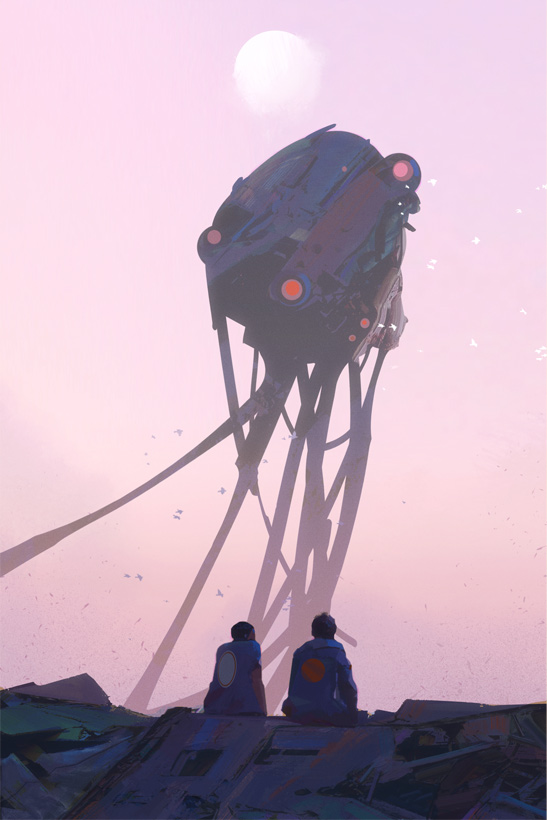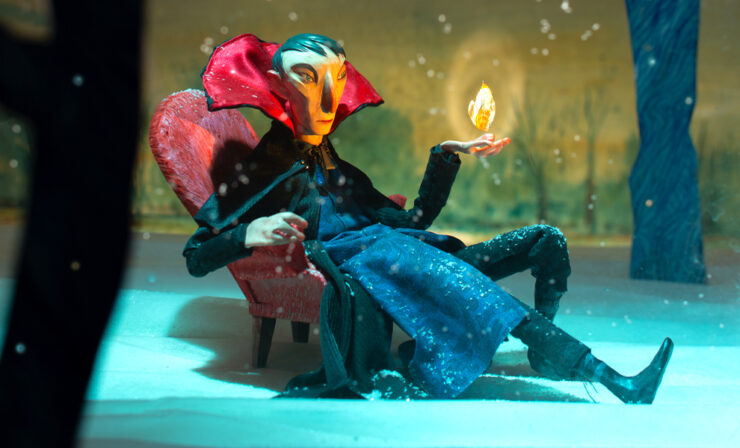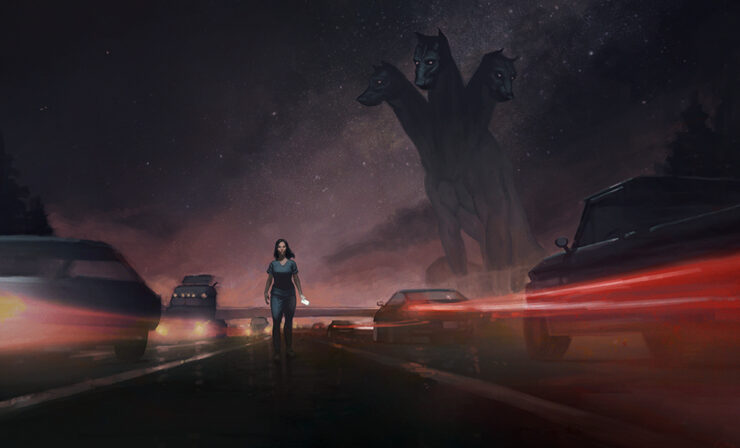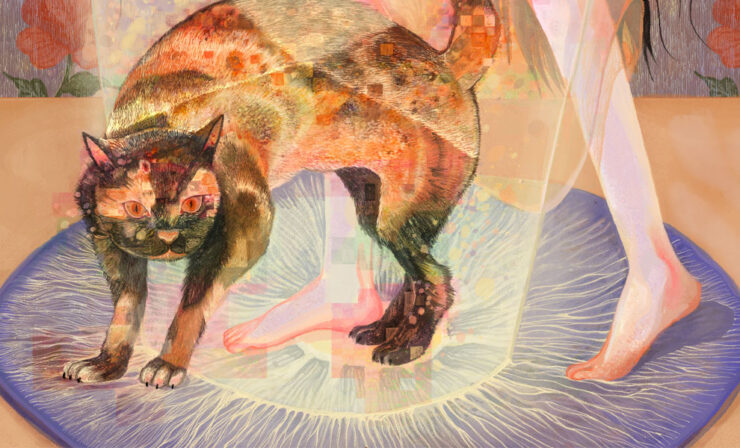Award-winning author Karin Tidbeck presents a science fiction adventure of a mysterious spaceship on an interstellar voyage in The Last Voyage of Skidbladnir.
Life on the transdimensional ship Skidbladnir is a strange one. The new janitor, Saga, finds herself in the company of an officious steward-bird, a surly and mysterious engineer, and the shadowy Captain. Who the odd passengers are, and according to what plan the ship travels, is unclear.
Just when Saga has begun to understand the inner workings of Skidbladnir, she discovers that something is wrong. Skidbladnir is sick. And it’s up to her and the engineer to fix it.
Something had broken in a passenger room. Saga made her way through the narrow corridors and down the stairs as fast as she could, but Aavit the steward still looked annoyed when she arrived.
“You’re here,” it said, and clattered its beak. “Finally.”
“I came as fast as I could,” Saga said.
“Too slow,” Aavit replied and turned on its spurred heel.
Saga followed the steward through the lounge, where a handful of passengers were killing time with board games, books and pool. They were mostly humans today. Skidbladnir had no windows, but the walls on the passenger levels were painted with elaborate vistas. There was a pine forest where copper spheres hung like fruit from the trees; there was a cliff by a raging ocean, and a desert where the sun beat down on the sand. Saga enjoyed the view whenever she was called downstairs to take care of something. The upper reaches had no such decorations.
The problem Saga had been called down to fix was in one of the smaller rooms. A maintenance panel next to the bed had opened, and a tangle of wires spilled out. The electricity in the cabin was out.
“Who did this?” Saga said.
“Probably the passenger,” Aavit replied. “Just fix it.”
Buy the Book
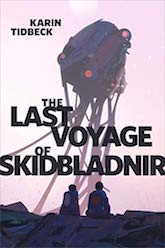

The Last Voyage of Skidblandir
When the steward had gone, Saga took a look around. Whoever stayed in the room was otherwise meticulous; almost all personal belongings were out of sight. Saga peeked into one of the lockers and saw a stack of neatly folded clothing with a hat on top. A small wooden box contained what looked like cheap souvenirs – key rings, a snow globe, a marble on a chain. The open maintenance hatch was very out of character.
Saga shined a flashlight into the mess behind the hatch. Beyond the wires lay something like a thick pipe. It had pushed a wire out of its socket. Saga checked that no wires were actually broken, then stuck a finger inside and touched the pipe. It was warm, and dimpled under her finger. Skidbladnir’s slow pulse ran through it. Saga sat back on her heels. Parts of Skidbladnir shouldn’t be here, not this far down. She re-attached the wiring, stuffed it back inside, and sealed the hatch with tape. She couldn’t think of much else to do. A lot of the work here consisted of propping things up or taping them shut.
The departure alarm sounded; it was time to buckle in. Saga went back upstairs to her cabin in maintenance. The air up here was damp and warm. Despite the heat, sometimes thick clouds came out when Saga exhaled. It was one of the peculiarities of Skidbladnir, something to do with the outside, what they were passing through, when the ship swam between worlds.
The building’s lower floors were reserved for passengers and cargo; Skidbladnir’s body took up the rest. Saga’s quarters were right above the passenger levels, where she could quickly move to fix whatever had broken in someone’s room. And a lot of things broke. Skidbladnir was an old ship. The electricity didn’t quite work everywhere, and the plumbing malfunctioned all the time. The cistern in the basement refilled itself at irregular intervals and occasionally flooded the cargo deck. Sometimes the ship refused to eat the refuse, and let it rot in its chute, so that Saga had to clean it out and dump it at the next landfall. Whenever there wasn’t something to fix, Saga spent her time in her quarters.
The cramped room served as both bedroom and living room: a cot, a small table, a chair. The table was mostly taken up by a small fat television with a slot for videotapes at the bottom. The closed bookshelf above the table held twelve videotapes: two seasons of Andromeda Station. Whoever had worked here before had left them behind.
Saga lay down in her cot and strapped herself in. The ship shuddered violently. Then, with a groan, it went through the barrier and floated free in the void, and Saga could get out of the cot again. When she first boarded the ship, Aavit had explained it to her, although she didn’t fully grasp it: the ship pushed through to an ocean under the other worlds, and swam through it, until they came to their destination. Like a seal swims from hole to hole in the ice, said Aavit, like something coming up for air every now and then. Saga had never seen a seal.
Andromeda Station drowned out the hum Skidbladnir made as it propelled itself through the space between worlds, and for just a moment, things felt normal. It was a stupid show, really: a space station somewhere that was the center of diplomatic relations, regularly invaded by non-human races or subject to internal strife, et cetera, et cetera. But it reminded Saga of home, of watching television with her friends, of the time before she sold herself into twenty tours of service. With no telephones and no computers, it was all she had for entertainment. She had already seen all of the episodes, so she picked one at random.
Season 2, episode 5: The Devil You Know.
The station encounters a species eerily reminiscent of demons in human mythology. At first everyone is terrified until it dawns on the captain that the “demons” are great lovers of poetry, and communicate in similes and metaphors. As soon as that is established, the poets on the station become the interpreters, and trade communications are established.
In the middle of the sleep shift, Skidbladnir’s hum sounded almost like a murmured song. As always, Saga dreamed of rushing through a space that wasn’t a space, of playing in eddies and currents, of colors indescribable. There was a wild, wordless joy. She woke up bathing in sweat, reeling from alien emotion.
On the next arrival, Saga got out of the ship to help engineer Novik inspect the hull. Skidbladnir had materialized on what looked like the bottom of a shallow bowl under a purple sky. The sandy ground was littered with shells and fish bones. Saga and Novik made their way through the stream of passengers getting on and off; dockworkers dragged some crates up to the gates.
Saga had seen Skidbladnir arrive, once, when she had first gone into service. First it wasn’t there, and then it was, heavy and solid, as if it had always been. From the outside, the ship looked like a tall and slender office building. The concrete was pitted and streaked, and all of the windows were covered with steel plates. Through the roof, Skidbladnir’s claws and legs protruded like a plant, swaying gently in some unseen breeze. The building had no openings save the front gates, through which everyone passed. From the airlock in the lobby, one climbed a series of stairs to get to the passenger deck. Or, if you were Saga, climbed the spiral staircase that led up to the engine room and custodial services.
Novik took a few steps back and scanned the hull. A tall, bearded man in rumpled blue overalls, he looked only slightly less imposing outside than he did in the bowels of the ship. He turned to Saga. In daylight, his gray eyes were almost translucent.
“There,” he said, and pointed to a spot two stories up the side. “We need to make a quick patch.”
Saga helped Novik set up the lift that was attached to the side of the building, and turned the winch until they reached the point of damage. It was just a small crack, but deep enough that Saga could see something underneath – something that looked like skin. Novik took a look inside, grunted and had Saga hold the pail while he slathered putty over the crack.
“What was that inside?” Saga asked.
Novik patted the concrete. “There,” he said. “You’re safe again, my dear.”
He turned to Saga. “She’s always growing. It’s going to be a problem soon.”
Season 2, episode 8: Unnatural Relations.
One of the officers on the station begins a relationship with a silicate-based alien life form. It’s a love story doomed to fail, and it does: the officer walks into the life form’s biosphere and removes her rebreather to make love to the life form. She lasts for two minutes.
Saga dreamed of the silicate creature that night, a gossamer thing with a voice like waves crashing on a shore. It sang to her; she woke up in the middle of the sleep shift and the song was still there. She put a hand on the wall. The concrete was warm.
She had always wanted to go on an adventure. It had been her dream as a child. She had watched shows like Andromeda Station and The Sirius Reach over and over again, dreaming of the day she would become an astronaut. She did research on how to become one. It involved hard work, studying, mental and physical perfection. She had none of that. She could fix things, that was all. Space had to remain a distant dream.
The arrival of the crab ships interrupted the scramble for outer space. They sailed not through space but some other dimension between worlds. When the first panic had subsided, and linguistic barriers had been overcome, trade agreements and diplomatic relations were established. The gifted, the rich and the ambitious went with the ships to faraway places. People like Saga went through their lives with a dream of leaving home.
Then one of the crab ships materialized in Saga’s village. It must have been a fluke, a navigation error. The crew got out and deposited a boy who hacked and coughed and collapsed on the ground. A long-legged beaked creature with an angular accent asked the gathered crowd for someone who could fix things. Saga took a step forward. The tall human man in blue overalls looked at her with his stony gray eyes.
“What can you do?” he asked.
“Anything you need,” Saga replied.
The man inspected her callused hands, her determined face, and nodded.
“You will do,” he said. “You will do.”
Saga barely said goodbye to her family and friends; she walked through the gates and never looked back.
The magic of it all faded over time. Now it was just work: fixing the electricity, taping hatches shut, occasionally shoveling refuse when the plumbing broke. Everything broke in this place. Of all the ships that sailed the worlds, Skidbladnir was probably the oldest and most decrepit. It didn’t go to any interesting places either, just deserts and little towns and islands far away from civilization. Aavit the steward often complained that it deserved a better job. The passengers complained of the low standard, the badly cooked food. The only one who didn’t complain was Novik. He referred to Skidbladnir not as an it, but as a she.
Over the next few stops, the electricity outages happened more and more frequently. Every time, living tubes had intertwined with the wiring and short-circuited it. At first it was only on the top passenger level. Then it spread to the next one. It was as if Skidbladnir was sending down parts of itself through the entire building. Only tendrils, at first. Then Saga was called down to fix the electricity in a passenger room, where the bulb in the ceiling was blinking on and off. She opened the maintenance hatch and an eye stared back at her. Its pupil was large and round, the iris red. It watched her with something like interest. She waved a hand in front of it. The eye tracked her movement. Aavit had said that Skidbladnir was a dumb beast. But the eye that met Saga’s did not seem dumb.
Saga went upstairs, past her own quarters, and for the first time knocked on the door to engineering. After what seemed like an age, the door opened. Engineer Novik had to stoop to see outside. His face was smudged with something dark.
“What do you want?” he said, not unkindly.
“I think something is happening,” Saga said.
Novik followed her down to the passenger room and peered through the hatch.
“This is serious,” he mumbled.
“What is?” Saga asked.
“We’ll talk later,” Novik said and strode off.
“What do I do?” Saga shouted after him.
“Nothing,” he called over his shoulder.
Novik had left the door to the captain’s office ajar. Saga positioned herself outside and listened. She had never really seen the captain; she hid in her office, doing whatever a captain did. Saga knew her only as a shadowy alto.
“We can’t take the risk,” the captain said inside. “Maybe it’ll hold for a while longer. You could make some more room, couldn’t you? Some extensions?”
“It won’t be enough,” Novik replied. “She’ll die before long. Look, I know a place where we could find a new shell.”
“And how would you do that? It’s unheard of. It’s lived in here since it was a youngling, and it’ll die in here. Only wild crabs can change shells.”
“I could convince her to change. I’m sure of it.”
“And where is this place?”
“An abandoned city,” Novik replied. “It’s out of our way, but it’d be worth it.”
“No,” the captain said. “Better sell it on. It won’t survive such a swap, and I’ll be ruined. If things have gone this far, I need to sell it to someone who can take it apart.”
“And I’m telling you she has a chance,” Novik said. “Please don’t pass her on to some butcher.”
“You’re too attached,” the captain retorted. “I’ll sell it on and use the money as down payment for a new ship. We’ll have to start small again, but we’ve done it before.”
Season 1, episode 11: The Natives Are Restless.
The lower levels of Andromeda Station are populated by the destitute: adventurers who didn’t find what they were looking for, merchants who lost their cargo, drug addicts, failed prophets. They unite under a leader who promises to topple the station’s regime. They sweep through the upper levels, murdering and pillaging in their path. They are gunned down by security. The station’s captain and the rebel leader meet in the middle of the carnage. Was it worth it? the captain asks. Always, says the rebel.
There was a knock on Saga’s door after her shift. It was Novik, with an urgent look on his face.
“It’s time you saw her,” he said.
They walked down the long corridor from Saga’s cabin to the engine room. The passage seemed somehow smaller than before, as if the walls had contracted. When Novik opened the door at the end of the corridor, a wave of warm air with a coppery tang wafted out.
Saga had imagined a huge, dark cavern. What Novik led her through was a cramped warren of tubes, pipes and wires, all intertwined with tendrils of that same grayish substance she had found in the hatches downstairs. As they moved forward, the tendrils thickened into ropes, then meaty cables. The corridor narrowed, so tight in spots that Novik and Saga had to push through it sideways.
“Here,” Novik said, and the corridor suddenly opened up.
The space was dimly lit by a couple of electric lights; the shapes that filled the engine room were only suggested, not illuminated. Round curves, glistening metal intertwined with that gray substance. Here, a slow triple beat shook the floor. There was faint wet noise of something shifting.
“This is she,” Novik said. “This is Skidbladnir.”
He gently took Saga’s hand and guided it to an outcrop. It was warm under her fingers, and throbbed: one two three, one two three.
“This is where I interface with her,” Novik said.
“Interface?” Saga asked.
“Yes. We speak. I tell her where to go. She tells me what it’s like.” Novik gently patted the gray skin. “She has been poorly for some time now. She’s growing too big for her shell. But she didn’t say how bad it was. I understood when you showed me where she’s grown into the passenger deck.”
One two three, one two three, thrummed the pulse under Saga’s hand.
“I know you were eavesdropping,” Novik said. “The captain and the steward will sell her off to someone who will take her apart for meat. She’s old, but she’s not that old. We can find her a new home.”
“Can I interface with her?” Saga said.
“She says you already have,” Novik said.
And Saga heard it: the voice, like waves crashing on a shore, the voice she had heard in her dream. It brought an image of a vast ocean, swimming through darkness from island to island. Around her, a shell that sat uncomfortably tight. Her whole body hurt. Her joints and tendrils felt swollen and stiff.
Novik’s hand on her shoulder brought her back to the engine room.
“You see?” he said.
“We have to save her,” Saga said.
Novik nodded.
They arrived at the edge of a vast and cluttered city under a dark sky. The wreckage of old ships dotted the desert that surrounded the city; buildings like Skidbladnir’s shell, cracked cylinders, broken discs and pyramids.
They had let off all passengers and cargo at the previous stop. Only the skeleton crew remained: the captain, the steward, Novik and Saga. They gathered in the lobby’s air lock, and Saga saw the captain for the very first time. She was tall, built from shadows and strange angles. Her face kept slipping out of focus. Saga only assumed her as a “she” from the soft alto voice.
“Time to meet the mechanics,” the captain said.
Novik clenched and unclenched his fists. Aavit looked at him with one cold sideways eye and clattered its beak.
“You’ll see reason,” it said.
The air outside was cold and thin. Novik and Saga put on their face masks; Aavit and the captain went as they were. The captain’s shroud fluttered in an icy breeze that brought waves of fine dust.
There was a squat office building among the wrecks. Its door slid open as they approached. Inside was a small room cluttered with obscure machinery. The air was warmer in here. Another door stood open at the end of the room, and the captain strode toward it. When Saga and Novik made to follow, Aavit held a hand up.
“Wait here,” it said, its voice barely audible in the thin atmosphere.
The other door closed behind them.
Saga looked at Novik, who looked back at her. He nodded. They turned as one and ran back toward Skidbladnir.
Saga looked over her shoulder as they ran. Halfway to the ship, she could see the captain emerge from the office, a mass of tattered fabric that undulated over the ground, more quickly than it should. Saga ran as fast as she could.
She had barely made it inside the doors when Novik closed them with a resounding boom and turned the great wheel that locked them. They waited for what seemed like an eternity as the air lock cycled. Something hit the doors with a thud, again and again, and made them shudder. As the air lock finally opened, Novik tore his mask off. His face was pale and sweaty underneath.
“They’ll find something to break the doors down,” he said. “We have to move quickly.”
Saga followed him up the spiral stairs, through the passages, to the engine room. As she stood with her hands on her knees, panting, Novik pushed himself into Skidbladnir’s mass face-first. It enveloped him with a sigh. The departure siren sounded.
Saga had never experienced a passage without being strapped down. The floor suddenly tilted, and sent her reeling into the wall. It was sticky and warm to the touch. Saga’s ears popped. The floor tilted the other way. She went flying headfirst into the other wall and hit her nose on something hard. Then the floor righted itself. Skidbladnir was through to the void between the worlds.
Saga gingerly felt her nose. It was bleeding, but didn’t seem broken. Novik stepped back from the wall. He looked at Saga over his shoulder.
“You’ll have to do captain’s job now,” he said.
“What?” Saga asked.
“That’s how it works. You read the map to me while I steer her.”
“What do I do?”
“You go up to the captain’s cabin. There’s a map. There’s a city on the map. It’s on the lower levels. It’s abandoned. Tall spires. You’ll see it.”
Saga went up to the captain’s cabin. The door was open. The space inside was filled by an enormous construction. Orbs of different sizes hung from the ceiling, sat on the ground, were mounted on sticks. Some of the orbs had little satellites. Some of them were striped, some marbled, some dark. In the space between them hung swirls of light that didn’t seem attached to anything. Close to the center, a rectangular object was suspended in the air. It looked like a tiny model of Skidbladnir.
There was a crackle. From a speaker near the ceiling, Novik’s voice said, “Step into the map. Touch the spheres. You’ll see.”
Saga carefully stepped inside. The swirls gave off small shocks as she grazed them, and though they seemed gossamer, they didn’t budge. She put her hand on one of the spheres, and her vision filled with the image of islands on green water. A red sun looked down on pale trees. She touched another, one that hung from the ceiling, and saw a bustling night-time town, shapes moving between houses, two moons shining in the sky. She touched sphere after sphere: vast desert landscapes, cities, forests, villages. The lower levels, Novik had said. Saga crouched down and felt the miniature worlds that littered the floor like marbles. Near the far corner, a dark sphere was a little larger than the others. As she touched it, there was an image of a city at dawn. It was still, silent. Tall white spires stretched toward the horizon. There were no lights, no movement. Some of the spires were broken.
“I think I found it,” she said aloud.
“Good,” Novik said through the speaker. “Now draw a path.”
Saga stood up, ducking the electrified swirls. She made her way into the center of the room where Skidbladnir hung suspended on seemingly nothing at all.
“How?” she asked.
“Just draw it,” Novik replied.
Saga touched Skidbladnir. It gave off a tiny chime. She traced her finger in the air. Her finger left a bright trail. She made her way across the room, carefully avoiding the glowing swirls, until she reached the sphere on the floor. As she touched the sphere, another chime sounded. The trail her finger had left seemed to solidify.
“Good,” said Novik in the speaker. “Setting the course.”
Saga wandered through the empty ship. There was no telling how long the journey would take, but on the map it was from the center of the room to the very edge, so perhaps that meant a long wait. She had gone back to the engine room, but the door was shut now. Whatever Novik did inside, while interfacing with Skidbladnir, he wanted to do undisturbed.
The main doors in the lobby had buckled inward, but not broken. The captain had used considerable force to try to get back in. The passenger rooms were empty. In the lounge, the pool table’s balls had gone over the edge and lay scattered on the floor. There was food in the mess hall; Saga made herself a meal of bread and cheese from the cabinet for human food. Then she went up to her quarters to wait.
Season 2 finale: All We Ever Wanted Was Everything.
The station is closing due to budget reasons; Earth has cut off funding because station management refuses to go along with their alien-unfriendly policies. No other race offers to pick up the bill, since they have started up stations of their own. In a bittersweet montage, the captain walks through the station and reminisces on past events. The episode ends with the captain leaving on a shuttle. An era is over. The alien navigator puts a claw on the captain’s shoulder: a new station is opening, and the captain is welcome to join. But it’ll never be an earthlike place. It’ll never be quite like home.
Skidbladnir arrived in a plaza at the city’s heart. The air was breathable and warm. Tall spires rose up into the sky. The ground beneath them was cracked open by vegetation. Novik got out first. He put his hands on his hips and surveyed the plaza. He nodded to himself.
“This will do,” he said. “This will do.”
“What happens now?” Saga asked.
“We stand back and wait,” Novik replied. “Skidbladnir knows what to do.” He motioned for Saga to follow him.
They sat down at the edge of the plaza, well away from Skidbladnir. Saga put her bags down; she hadn’t brought much, just her clothes, some food, and her favorite episodes of Andromeda Station. Perhaps she would find a new tape player somewhere.
They waited for a long time. Novik didn’t say much; he sat with his legs crossed in front of him, gazing up at the spires.
At dusk, Skidbladnir’s walls cracked open. Saga understood why Novik had positioned them so far away from the building; great lumps of concrete and steel fell down and shook the ground as the building shrugged and shuddered. The tendrils that waved from the building’s cracked roof stiffened and trembled. They seemed to lengthen. Walls fell down, steel windows sloughed off, as Skidbladnir slowly extricated herself from her shell. She crawled out from the top, taking great lumps of concrete with her. Saga had expected her to land on the ground with an almighty thud. But she made no noise at all.
Free of her house, Skidbladnir was a terror and wonder to behold. Her body was long and curled; her multitude of eyes gleamed in the starlight. Her tendrils waved in the warm air as if testing it. Some of the tendrils looked shrunken and unusable. Saga also saw that patches of Skidbladnir’s body weren’t as smooth as the rest of her; they were dried and crusted. Here and there, fluid oozed from long scratches in her skin.
Next to Saga, Novik made a muffled noise. He was crying.
“Go, my love,” he whispered. “Find yourself a new home.”
Skidbladnir’s tendrils felt the buildings around the plaza. Finally, they wrapped themselves around the tallest building, a gleaming thing with a spiraled roof, and Skidbladnir pulled herself up the wall. Glass tumbled to the ground as Skidbladnir’s tendrils shot through windows to pull herself up. She tore through the roof with a thunderous noise. There was a moment when she supported her whole body on her tendrils, suspended in the air; she almost toppled over the side. Then, with what sounded like a sigh, she lowered herself into the building. Saga heard the noise of collapsing concrete as Skidbladnir’s body worked to make room for itself. Eventually, the noise subsided. Skidbladnir’s arms hung down the building’s side like a crawling plant.
“What now?” Saga said.
She looked sideways at Novik. He smiled at her.
“Now she’s free,” he said. “Free to go wherever she pleases.”
“And what about us?” Saga asked. “Where do we go?”
“With her, of course,” Novik replied.
“There’s no map,” Saga said. “Nothing to navigate by. And the machinery? Your engine room?”
“That was only ever needed to make her go where we wanted her to,” Novik said. “She doesn’t need that now.”
“Wait,” Saga said. “What about me? What if I want to go home?”
Novik raised an eyebrow. “Home?”
A chill ran down Saga’s back. “Yes, home.”
Novik shrugged. “Perhaps she’ll stop by there. There’s no telling what she’ll do. Come on.”
He got up and started walking toward Skidbladnir and her new shell. Saga remained on the ground. Her body felt numb. Novik went up to the building’s front door, which slid open, and he disappeared inside.
Season 1, episode 5: Adrift.
The captain’s wife dies. She goes into space on a private shuttle to consign the body to space. While in space, the shuttle malfunctions. The captain finds herself adrift between the stars. The oxygen starts to run out. As the captain draws what she thinks are her last breaths, she records one final message to her colleagues. Forgive me for what I did and didn’t do, she says. I did what I thought was best.
Life on the new Skidbladnir was erratic. Novik spent most of his time interfaced, gazing into one of Skidbladnir’s great eyes in a hall at the heart of the building. Saga spent much of her time exploring. This had been someone’s home once, an apartment building of sorts. There were no doors or windows, only mazelike curved hallways that with regular intervals expanded into rooms. Some of them were empty, others furnished with oddly shaped tables, chairs and beds. Some wall-to-wall cabinets held knickknacks and scrolls written in a flowing, spiraled script. There were no means to cook food in any way Saga could recognize. She made a nest in one of the smaller rooms close to where Novik worked with Skidbladnir. The walls gave off a soft glow that dimmed from time to time; Saga fell into the habit of sleeping whenever that happened. Drifting off into sleep, she sometimes thought she could hear voices speaking in some vowel-rich tongue, but they faded as she listened for them.
Skidbladnir did seem concerned for Saga and Novik. She stopped at the edge of towns every now and then, where Saga could breathe and was able to trade oddities she found in the building that was now her new home for some food and tools. But mostly they were adrift between worlds. It seemed that Skidbladnir found her greatest joy in coasting the invisible eddies and waves of the void. Every time they stopped somewhere, Saga considered getting off to try her luck. There might be another ship that could take her home. But these places were too strange, too far-flung. It was as if Skidbladnir was avoiding civilization. Perhaps she sensed that Aavit and the old captain might be after them. That thought gnawed at Saga every time they stopped somewhere. But there was such a multitude of worlds out there, and no one ever seemed to recognize them.
She tore the Andromeda Station tapes apart and hung them like garlands over the walls, traced her finger along them, mumbled the episodes to herself, until Skidbladnir shuddered and she took cover for the next passage.
Each time Skidbladnir pushed through to another world, it was more and more violent.
“Is she going to hold?” Saga asked Novik on one of the rare occasions he came out from his engine room to eat.
Novik was quiet for a long moment. “For a time,” he said.
“What are you going to do when she dies?” Saga asked.
“We’ll go together, me and her,” he replied.
One day, improbably, Skidbladnir arrived outside a place Saga recognized. A town, not her hometown, but not so far away from it.
Novik was nowhere to be seen. He was sleeping or interfaced with the ship. Saga walked downstairs, and the front door slid open for her. Outside, a crowd had gathered. An official-looking man walked up to Saga as she came outside.
“What’s this ship?” he said. “It’s not on our schedule. Are you the captain?”
“This is Skidbladnir,” Saga said. “She’s not on anyone’s schedule. We don’t have a captain.”
“Well,” the official said. “What’s your business?”
“Just travel,” Saga said.
She looked back at Skidbladnir. This was her chance to get off, to go home. Novik would barely notice. She could return to her life. And do what, exactly? The gathered crowd was composed of humans, their faces dull, their eyes shallow.
“Do you have a permit?” the official asked.
“Probably not,” Saga said.
“I’ll have to seize this ship,” the official said. “Bring out whoever is in charge.”
Saga gestured at Skidbladnir’s walls. “She is.”
“This is unheard of,” the official said. He turned away and spoke into a comm radio.
Saga looked at the little town, the empty-faced crowd, the gray official.
“Okay. I am the captain,” she said. “And we’re leaving.”
She turned and walked back to Skidbladnir. The door slid open to admit her. The hallway inside thrummed with life. She put a hand on the wall.
“Let’s go,” she said. “Wherever you want.”
Pilot episode: One Small Step.
The new captain of Andromeda Station arrives. Everything is new and strange; the captain only has experience of Earth politics and is baffled by the various customs and rituals practiced by the other aliens on the station. A friendly janitor who happens to be cleaning the captain’s cabin offers to give her a tour of all the levels. The janitor, it turns out, has been on the station for most of his life and knows all of the station’s quirks. She’s confusing as hell at first, he says. But once you know how to speak to her, she will take good care of you.
Saga took the tapes down and rolled them up. It was time to be the captain of her own ship, now. A ship that went where it wanted to, but a ship nonetheless. She could set up proper trade. She could learn new languages. She could fix things. She was good at fixing things.
One day Skidbladnir would fail. But until then, Saga would swim through the void with her.
Text copyright © 2019 by Karin Tidbeck
Art copyright © 2019 by Victor Mosquera
Buy the Book


The Last Voyage of Skidblandir










